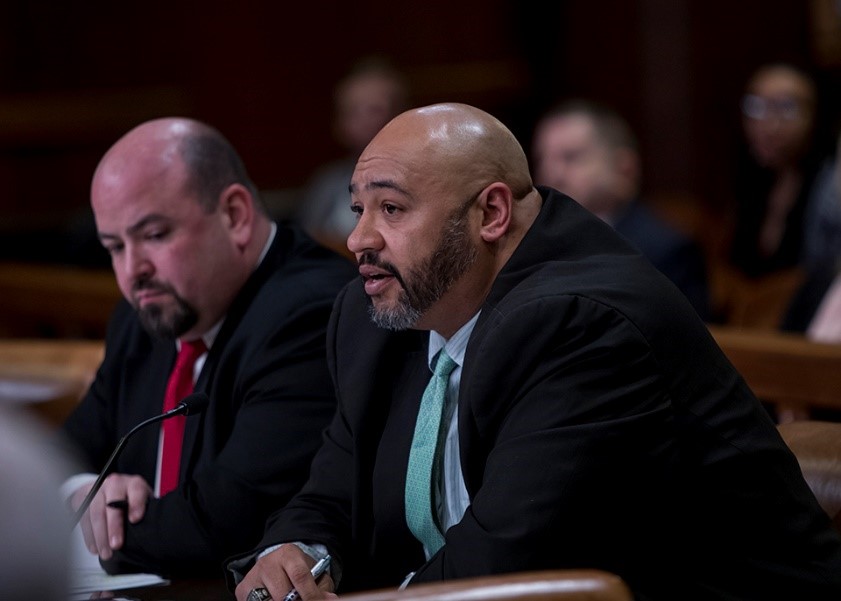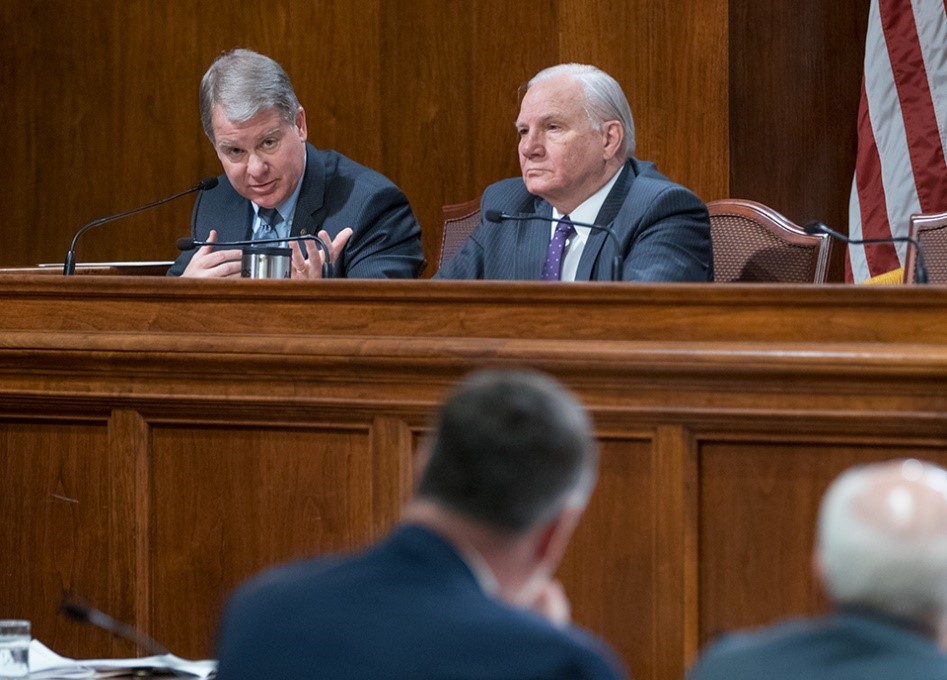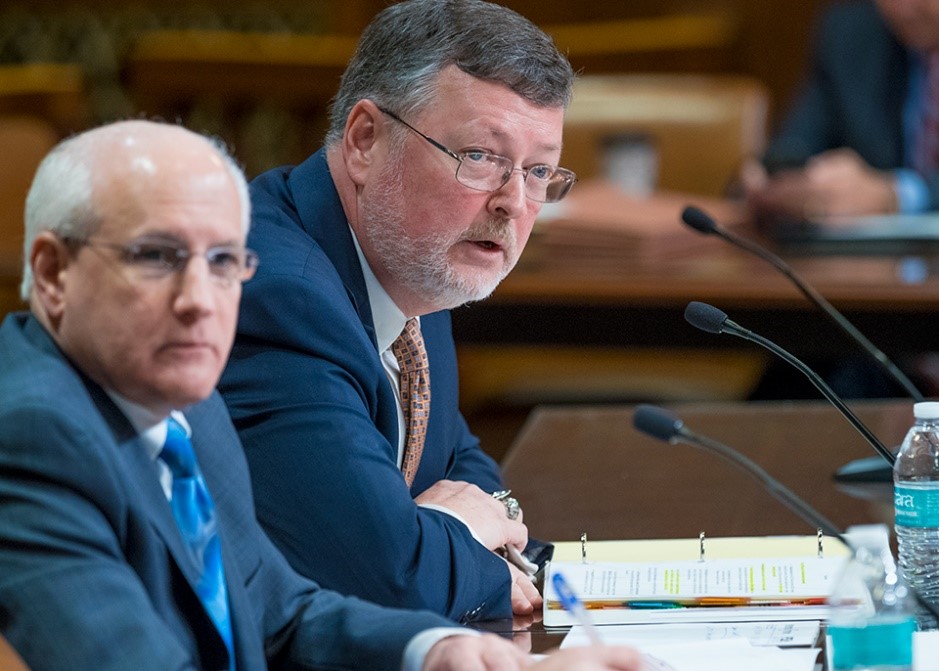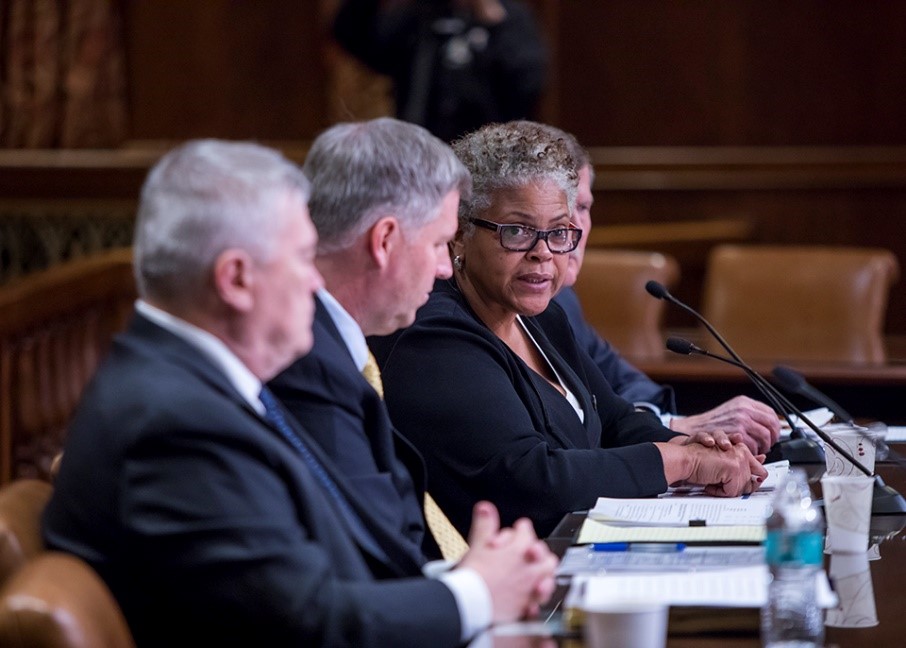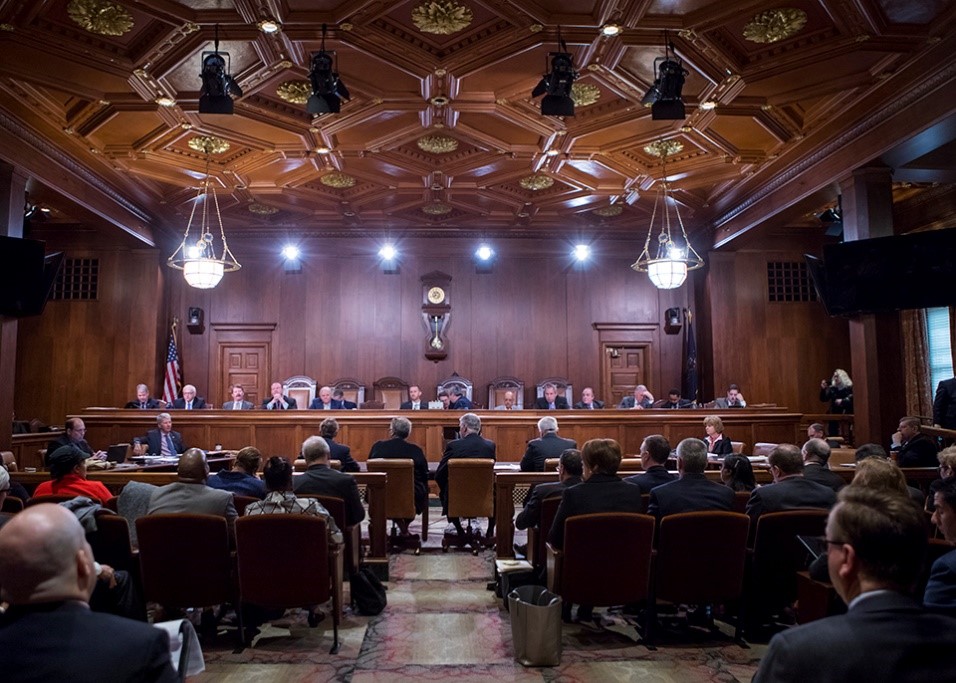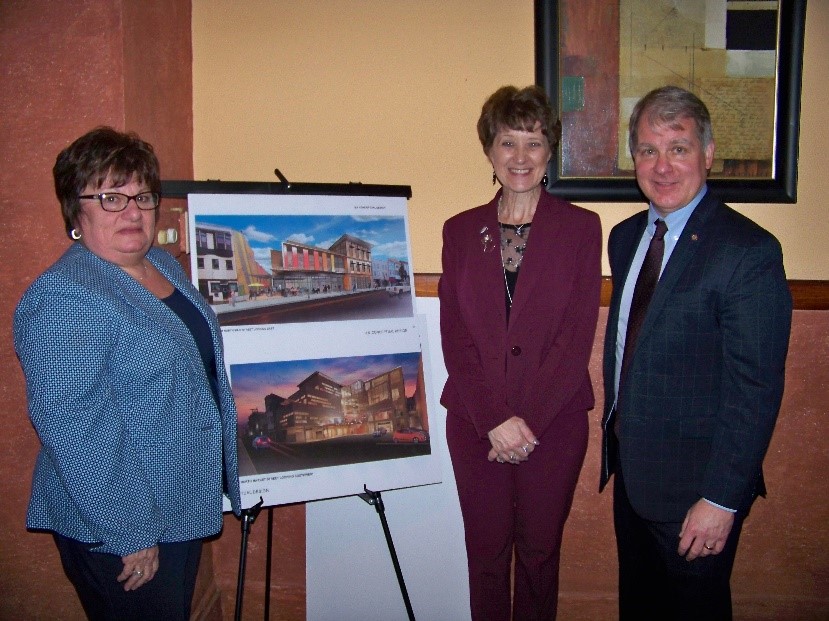
|
|||||||||||||||||||||
|
Follow Sen. Argall on Twitter for Senate happenings –
@SenatorArgall
In this email update:
Future state prison closings?Discussing the forecast for potential state prison closings was my main concern during Thursday’s budget hearing with Secretary Wetzel of the Department of Corrections. During the hearing, I asked Secretary Wetzel about additional prison closures in the future and if any changes have occurred. Secretary Wetzel noted that while the possibility still remains for future state prison closings, it is unlikely that it will happen in the next year. On January 6, 2017, the Pennsylvania Department of Corrections publicly announced the closures of two of five selected state correctional institutions located across the state. A final decision for closures was set for January 26, 2017, leaving only twenty days to gather feedback from parties directly affected by these closings, including the institutions’ workforce, local governments and elected officials. To address this issue, I introduced Senate Bill 748 which establishes the Public Safety Facilities Act to ensure there is adequate notice and consideration of any proposed state correctional institution closures, as well as other structures that employ law enforcement staff. The bill requires specific notification requirements and the development of comprehensive strategies to minimize undue stress on employees and local communities. The bill is modeled after a law passed in New York regarding a similar debate. This bipartisan bill unanimously passed the Senate State Government Committee. I asked Secretary Wetzel if the department has taken a position on this initiative. Watch our discussion here. Tackling blight in our communities through bipartisan teamworkSource: The Republican Herald 2/23/18 Revitalizing our communities is neither an overnight task, nor a feat that can be accomplished without the help of many people. For the past several decades, I’ve worked with leaders at the local, county, state and federal levels, private and public sectors, to combat blight in Schuylkill County and make our communities more vibrant. I am glad that I’ve been able to work alongside my bipartisan colleagues in the House and Senate and local elected officials to fight for more funding that will provide more job opportunities for residents. While Pennsylvania has some of the strictest laws in the country when it comes to tackling blight, the crux of the issue lies in the fact that so many municipalities do not have the necessary funds to demolish blighted buildings and properties. From the rebuilding of the Tamaqua Train Station to the revitalization of the Salvation Army and Lehigh Carbon Community College, none of these projects would have come to fruition without the collaboration between state and local officials and public and private partnerships. Read more about our revitalization efforts over the years from the Republican Herald here. On Wednesday evening, Representatives Goodman and Tobash and I also attended the Pottsville State of the City Address where Mayor Muldowney recognized our revitalization efforts for the city. In January, the Pottsville Area Development Corporation (PADCO) was granted $50,000 to be used to incentivize façade improvements by commercial property owners in Pottsville City’s business districts through DCED’s Keystone Communities Program. I look forward to working with PADCO and business owners to improve the Pottsville community one façade at a time. Why is the governor opposed to work requirements for able-bodied welfare recipients?Trying to figure out why the governor is opposed to enacting work requirements for able-bodied welfare recipients was my main focus during Monday’s budget hearing with the Secretary of the Department of Labor & Industry. This past October, the governor vetoed bipartisan welfare reform measures in House Bill 59 which would establish a work requirement for able-bodied Medicaid recipients. The goal of this requirement was to reduce long-term costs by encouraging recipients to find employment and become self-sufficient, rather than continue to rely upon the taxpayer. This has been the case in other states which have enacted this requirement and it is perplexing as to why the governor chose to veto this legislation which would reduce fraud and protect taxpayer dollars. During the budget hearing, Secretary Oleksiak failed to provide any insight on the governor’s position stating his unfamiliarity with the welfare reform measure. Watch my comments here. Discussing safety initiatives with the PennDOT SecretaryOn Monday’s budget hearing with the PennDOT Secretary, Leslie Richards, I asked her to provide information on the implementation of traffic circles on our roadways – an initiative that residents, particularly in Maidencreek Township, Berks County, have reached out to me with their concerns. Secretary Richards mentioned that the use of traffic circles has improved safety by reducing the number of fatalities and accidents, while also acknowledging that traffic circles are not going to be conducive everywhere. During the hearing, I also asked her to provide updates on the REAL ID Program and their collaboration with the Aviation Council of Pennsylvania. You can watch our discussion here. Reducing the state’s real estate footprint on the state’s agenciesAs Chairman of the Senate Majority Policy Committee, I have been working with my colleagues on a number of plans to reduce state spending and save taxpayers money. Senator Vulakovich and I are working on an important initiative that evaluates the current practices of real estate utilization policies of state owned and leased office space, storage facilities, garages and other property. The Joint State Government Committee provided a report indicating that over the last 4 years, leased office space has been reduced by about 590,000 square feet and we reduced the number of state employees by about 1500. While this is a step in the right direction, the problem still exists that even with the reduction in real estate, we are still paying for vacant office space across the state. Why? This was my main emphasis during the budget hearing with the Department of General Services. I asked the department if they have established a specific target for reducing their real estate footprint. Watch this commentary here. State-related universities projected to increase in enrollment over PASSHE universitiesUnderstanding the factors that attribute to the growth in enrollment for the state-related universities which includes Penn State, Temple, Pitt and Lincoln, was a main focus of mine during Tuesday’s Senate Appropriations Committee budget hearing. During the hearing with officials from these universities, I asked them to explain the extraordinary dichotomy that exists between their enrollment numbers versus the enrollment numbers of the 14 PASSHE universities. Based on the governor’s proposed budget, PASSHE universities are expected to decline by more than 1300 students between now and 2022, while these four universities are projected to increase by 12,000. You can watch my comments here. Grand jury courtroom to be placed inside Harrisburg’s Judicial CenterIn my continued efforts to find ways to save taxpayers money, I asked the members of the Judicial Branch what efforts they have made to consolidate their offices and utilize these spaces in the most efficient manner. The members informed me that in collaboration with the Attorney General’s Office, they will be placing a grand jury courtroom inside Harrisburg’s Judicial Center. Watch the hearing and learn more about their consolidation efforts here. Local dairy farms struggle with falling milk pricesEmphasizing the need to find solutions for local dairy farmers that are struggling financially to survive because of declining milk prices was the key topic of concern during Wednesday’s budget hearing with the Department of Agriculture. For the past three years, we’ve seen a decline in milk prices, and as we head into our fourth year, the projections seem to be abysmal as well. Several dairy farmers in both Berks and Schuylkill Counties have witnessed firsthand the negative impact that falling milk prices have had on their business and overall livelihood. Another cause for concern we are seeing is big companies bringing in thousands of cows – for example 20,000 in Texas, therefore putting small, local farms out of business. I asked the department what they are working on to help our family-owned farms survive this difficult time. Watch the discussion here. Work remains for cleaning up tire scrap pilesDuring the state budget hearing with DEP, I asked the Secretary if they have reached their end point with priority piles as they had projected last year during this time. Unfortunately, the department still has two huge piles to clean-up… As the prime sponsor of the Waste Tire Recycling Act, which has helped to clean up more than 95 percent of Pennsylvania’s waste tires, I am hoping that the department gets this done – and the sooner the better! Watch the discussion here. Wolf Administration breaks state record on cabinet level departuresBased on the research gathered from the Senate Policy Development & Research Office, the current number of cabinet-level vacancies in the Wolf Administration is at a new record of six vacancies. In fact, the record number for vacancies at one time was four cabinet-level vacancies, with those instances occurring at either the beginning or end of a gubernatorial term. From May 2010 until the end of the Rendell Administration, there were four vacancies filled by acting secretaries that were not confirmed by the Senate for the Department of Corrections, Department of Education, Department of Health and the Department of Insurance. Also, in the beginning of the Ridge Administration, there were four acting secretaries for the Department of Agriculture, Department of Education, Department of Health and Department of Revenue. By the end of March 1995, all four departments had Senate-confirmed secretaries. Listed below are the vacancies, the last Senate confirmed Secretary and the Administration’s reasons for their departure:
During the Senate Appropriations Committee budget hearing with the Department of State last week, I asked Acting Secretary Torres if he could explain the record number of departures of this Administration and if he could expand on why his predecessor resigned. Not surprising anyone, he could not comment on the abrupt resignation, nor could he explain the record number of vacancies across other state agencies. Watch the questions during the budget hearing. And this is an Administration whose key pillar is a “Government that Works?” Respecting the ConstitutionThe issue of redistricting has been the hot topic in Pennsylvania over the past several weeks. Last week, the State Supreme Court issued their own congressional district map after the governor refused to consider the map that was presented by the legislative leadership. To say that this situation is confusing would be an understatement. Four Democratic State Supreme Court judges, by a four to three vote, have completely disregarded the concept of separation of powers as laid out in our constitution. My neighbor, Senator Mike Folmer, who is viewed as an outsider to the party establishment, has made this issue a top priority of his for many years. In a recent column he discusses the importance of respecting the constitution, which grants the legislature with the authority to establish Congressional districts. In his column, Senator Folmer notes our current situation as a “constitutional crisis thanks to the Pennsylvania Supreme Court’s actions to make the other two branches of government irrelevant.” Read Senator Folmer’s full column here. Senator Folmer is also going to host a public hearing on all proposals dealing with redistricting later this month. One of the first bills I ever introduced was on this subject, and I have been consistent in my position on this issue: I hope the U.S. Supreme Court soon ends the confusion and gives us one clear standard – rather than the current hodgepodge of competing judicial decisions in Wisconsin, Maryland, North Carolina, Pennsylvania, and beyond. Mahanoy City Borough receives safety grant to improve pedestrian facilitiesMahanoy City Borough has been awarded a $68,000 Pennsylvania Department of Transportation grant to upgrade pedestrian facilities at the intersection of Route 339 (North Main Street) and Park Place Road by installing new ADA-compliant curb ramps, sidewalks and signs. The Automated Red Light Enforcement (ARLE) funding program helps communities across the state make investments in traffic flow and safety. Projects improving safety, enhancing mobility, and reducing congestion can be considered for funding. They were selected by an eight-member committee based on criteria such as benefits and effectiveness, cost, local and regional impact, and cost sharing. This safety grant is part of a revitalization of the north end of Main St. in Mahanoy City. Last year, the borough demolished the former Kaiers Brewery building and will begin work this spring to develop a park at the site. Good things are happening at the north end of Main St. and I’m grateful that the state has recognized the borough’s commitment to a better neighborhood and a safer community. Downtown Shenandoah Inc. becomes part of the Neighborhood Assistance ProgramOn Tuesday evening, I attended the celebratory event for Downtown Shenandoah Inc.’s acceptance into the Neighborhood Assistance Program. Back in January, Representative Neal Goodman (D-Berks) and I announced that Downtown Shenandoah Inc. received a $22,000 grant through DCED’s Neighborhood Assistance Program. The state funding will be used to build a business incubator at the former site of the J.C. Penney Building which was destroyed by a fire. Downtown Shenandoah Inc.’s involvement with the Neighborhood Assistance Program will provide many opportunities to revitalize the downtown business area and create more local jobs for residents. Read more from the Republican Herald here. Schuylkill County Intermediate Unit 29’s What’s Next ConferenceOn Saturday, March 10, the Schuylkill County Intermediate Unit 29 will be hosting its first annual What’s Next Conference to provide 8-12th grade students and their parents with information about education and career opportunities for the future. The conference will be held at the Penn State Schuylkill Campus from 9 a.m. until 2:30 p.m. For more information about this free-of-charge event, please click here. |
|||||||||||||||||||||
|
|||||||||||||||||||||




2024 © Senate of Pennsylvania | https://www.senatorargall.com | Privacy Policy |



